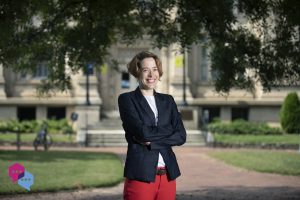Andrea Bohlman is an associate professor in the Department of Music within the UNC College of Arts & Sciences and a recipient of the 2020 Hettleman Award for Artistic and Scholarly Achievement. She explores the diverse music that permeates past and present cultures and why people use music during political movements.

Q: When you were a child, what was your response to this question: “What do you want to be when you grow up?”
A: I wanted to be a visual artist first, I think. Then I realized I just liked crayons and was fairly uninspired as a creator. So I pivoted to professional baseball player. That was an intermittent dream that phased in and out with pharmacist. I wanted to work in the drug store my uncle and aunt ran.
Q: Share the pivotal moment in your life that helped you choose your field of study.
A: After six months of studying abroad in Berlin during college, I realized I’d been having arguments about politics, going to hear and see music, or traveling in every spare moment. I knew that kind of voracious appetite suited academic research and took a leap applying for master’s programs in Europe that would allow me to figure out if academic writing suited me.
Q: Tell us about a time you encountered a tricky problem. How did you handle it and what did you learn from it?
A: Even though I study music and technology — especially sound recording — some of my most generative research has emerged in moments when media fail. My batteries ran out of power when I was recording an interview. A collection of cassette tapes that were crucial for my research because of their combination of music-making and political debate were actually dubbed over with things like Michael Jackson mixes.
These little wrinkles urged me to adapt and relinquish particular goals. I spent the evening sans batteries first writing out notes, but then actually putting my questioning aside — trusting that conversation would lead my research new places. It did. The music critic I was speaking to invited me backstage after concerts to speak with artists and shared with me his private archive of concert notes, always asking me not to record or take pictures as a matter of trust. In the case of the re-recorded tapes, the incident set me on a new research path that explored sound recordings not just as archives, but as dynamic and unstable records of human creativity. So I guess I took on the “problem” as a new phenomenon to study.
Q: Describe your research in 5 words.
A: Make sound, make political change.
Q: What are your passions outside of research?
A: Whether I’m in North Carolina or in Europe doing research, I travel a lot by bike. It helps me think — and it helps me stop thinking. But that kind of slow travel, where I become reliant on local infrastructure and community for food, shelter, and navigation, keeps me grounded. I love small interactions with strangers about the everyday objects in their lives. It helps me remember that music is just one of the ways people are creative.
